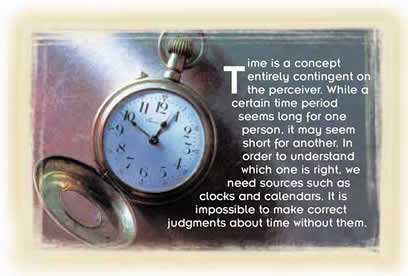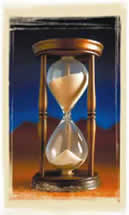
The Relativity of Time
Today, the relativity of time is a proven scientific fact. This was revealed by Einstein's theory of relativity at the early years of the 20th century. Until then, people did not know that time was a relative concept, and that it could change according to the environment. Yet, the great scientist Albert Einstein openly proved this fact with the theory of relativity. He showed that time is dependent on mass and velocity. In the history of humanity, no one had expressed this fact clearly before.
With one exception though; the Qur'an included information about time's being relative! Some verses about the subject read:
"They
ask you to hasten the punishment. God will not break His promise. A
day with your Lord is equivalent to a thousand years in the way you
count."
(The Qur'an, 22:47)

"He
directs the whole affair from heaven to earth. Then it will again
ascend to Him on a Day whose length is a thousand years by the way
you measure."
(The Qur'an, 32:5)
" The
angels and the Spirit ascend to Him in a day whose length is fifty
thousand years."
The
angels and the Spirit ascend to Him in a day whose length is fifty
thousand years."
(The Qur'an, 70:4)
In some verses, it is indicated that people perceive time differently and that sometimes people can perceive a very short period of time as a very lengthy one. The following conversation of people held during their judgement in the Hereafter is a good example of this:
"He
will say, 'How many years did you tarry on the earth?' They will say,
'We tarried there for a day or part of a day. Ask those able to
count!' He will say, 'You only tarried there for a little while if
you did but know!"
(The Qur'an, 23:112-114)
The
fact that the relativity of time is so clearly mentioned in the
Qur'an, which started to be revealed in 610, is another evidence that
it is a holy book.
Source:
http://www.harunyahya.com/miracles_of_the_quran_p1_14.php
WebSite:
http://www.harunyahya.com/
Free
Ebook
Learning
from the Qur'an
[[ Yuksel’s note - 011:007 The expression "six days" provide comparison. For instance, we learn that though the creation of galaxies took two days, the creation of earth to be habitable for life took four days
(41:10-12). In other words, the creation of earth started 13.7 billion x 4/6 years ago. As for time, the Quran informs us that it is relative (32:5 and 70:4). The earth was initially covered with water; lands emerged later.]]
The Speed of Light [Yuksel]
32:5 He arranges matters from the heaven to the earth, and then it ascends to Him in a day which is equivalent to one thousand of the years which you count.
32:6 Such is the Knower of the unseen and the seen; the Noble, the Compassionate.
70:4 The angels and the Spirit ascend to Him in a day which is equivalent to fifty thousand years.*
070:004 Time is relative. See 22:47; 32:5.
====================================================
20. Sura Taha
The Quranic Text & Ali’s Version:
كَذَلِكَ نَقُصُّ
عَلَيْكَ مِنْ
أَنبَاء مَا
قَدْ سَبَقَ...
![]()
20: 99. for We have sent thee a Message from Our own Presence.
...وَقَدْ آتَيْنَاكَ مِن لَّدُنَّا ذِكْرًا ﴿٩٩﴾
for We have sent thee a Message from Our own Presence.
C2625. Thus superseding previous revelations; for this (the Quran) is direct from Allah, and is not a second-hand exposition on other men's authority.
مَنْ
أَعْرَضَ عَنْهُ
فَإِنَّهُ
يَحْمِلُ يَوْمَ
الْقِيَامَةِ
وِزْرًا ﴿١٠٠﴾
![]()
20:100. If any do turn away therefrom, verily they will bear a burden on the Day of Judgement;
20:101. They will abide in this (state):
...وَسَاء لَهُمْ يَوْمَ الْقِيَامَةِ حِمْلًا ﴿١٠١﴾
and grievous will the burden be to them on that Day --
C2626. Cf. 6:31.
If people are so immersed in the evanescent falsehoods of this life as to turn away from the True and the Eternal, they will have a rude awakening when the Judgment comes. These very things that they thought so enjoyable here;-
- taking advantage of others,
- material self-indulgence,
- nursing grievances instead of doing good, etc., -
will be a grievous burden to them that day, which they will not be able to escape or lighten.
يَوْمَ يُنفَخُ
فِي الصُّورِ...
![]()
20:102. The Day when the Trumpet will be sounded:
...وَنَحْشُرُ الْمُجْرِمِينَ يَوْمَئِذٍ زُرْقًا ﴿١٠٢﴾
that Day, We shall gather the sinful, blear-eyed (with terror),
C2627. Zurqa:
- having eyes different from the normal colour, which in the East is black and white;
- having blue eyes,
- or eyes afflicted with dimness or blindness, or squint;
hence metaphorically, blear-eyed (with terror).
يَتَخَافَتُونَ
بَيْنَهُمْ
إِن لَّبِثْتُمْ
إِلَّا عَشْرًا ﴿١٠٣﴾
![]()
20:103. In whispers will they consult each other:
"Ye tarried not longer than ten (Days);"
C2628. Faced with eternity they will realise that their life on this earth, or the interval between their sin and their punishment, had a duration which practically amounted to nothing.
They express this by the phrase "ten days", but their wiser heads think that even this is an over-estimate. It was but a brief day!
نَحْنُ
أَعْلَمُ بِمَا
يَقُولُونَ...
![]()
20:104. We know best what they will say,
...إِذْ يَقُولُ أَمْثَلُهُمْ طَرِيقَةً إِن لَّبِثْتُمْ إِلَّا يَوْمًا ﴿١٠٤﴾
when their leader most eminent in Conduct will say: "Ye tarried not longer than a day!"
Note that it is the shrewdest and most versed in Life who will say this, because they will be the first to see the true situation.
Asad’s Version:
20:99
THUS DO WE relate unto thee some of the stories of what happened in the past; and [thus]
have We vouchsafed unto thee, out of Our grace, a reminder. 85
20:100
All who shall turn away from it will, verily, bear a [heavy] burden on the Day of Resurrection:
(20:101) they will abide in this [state], and grievous for them will be the weight [of that burden] on the Day of Resurrection –
(20:102) on the Day when the trumpet is blown: for on that Day We will assemble all such as had been lost in sin, their eyes dimmed 86 [by terror],
(20:103) whispering unto one another, "You have spent but ten [days on earth]...." 87
(20:104)
[But] We know best 88 what they will be saying when the most perceptive of them shall say,
"You have spent [there] but one day!"
[[ Asad’s notes –
[[Asad’s notes:
85 Lhe adverb kadhalika ("thus") which introduces this verse is meant to stress the purpose of all
Qur'anic references to past events - be they historical or legendary - as well as the manner in
which the relevant stories are treated. Since the purpose underlying every Qur'anic narrative is,
invariably, the illustration of certain fundamental truths, the narrative as such is often condensed
and elliptic, omitting all that has no direct bearing on the point or points which the Qur'an means
to bring out. The term "reminder" alludes to the unceasing guidance which God offers to man
through His revelations.
86 Lit., "blue [of eye]" - i.e., as if their eyes were covered with a bluish, opaque film.
87 As in several other places in the Qur'an (e.g., in 2:259, 17:52, 18:19, 23:112-113, 30:55, 79:46, etc.), this and the next verse touch upon the illusory character of maris consciousness of "time" and, thus, upon the relativity of the concept of "time" as such. The number "ten" is often used in Arabic to denote "a few" (Razi).
88 Signifying, in this context, "We alone understand fully". ]]
22:47 [al-Hajj, Medina 103]
And [so, O Muhammad,] they challenge thee to hasten the coming upon them of [God's] chastisement:" but God never fails to fulfil His promise - and, behold, in thy Sustainer's sight a day is like a thousand years of your reckoning."
(22:48) And to how many a community that was immersed in evildoing have I given rein for a while! But then I took it to task: for with Me is all journeys' end!
23. [al Muminun, Mecca 74]
The Quranic Text & Ali’s Version:
قَالَ
كَمْ لَبِثْتُمْ
فِي الْأَرْضِ
عَدَدَ سِنِينَ
﴿١١٢﴾
![]()
23:112. He will say: "What number of years did ye stay on earth?"
C2948. The Hafs reading is "Qala", "He will say". This follows the Kufa Qira'ah.
The Basra Qira'ahreads "Qul", "Say" (in the imperative).
The point is only one of grammatical construction.
See n. 2666 to 21:4. (R).
قَالُوا
لَبِثْنَا
يَوْمًا أَوْ
بَعْضَ يَوْمٍ...
![]()
23:113. They will say: "We stayed a day or part of a day:
C2949. The question and answer about Time imply two things.
1. The attention of the ungodly is drawn to the extremely short time of the life in this world, compared to the eternity which they face: they are made to see this, and to realise how mistaken they were in their comparative valuation of things spiritual and things material.
2. Time, as we know it now, will have faded away and appear as almost nothing. It is just a matter relative to this life of temporary probation.
Cf. the experience of the Companions of the Cave: 18:19.
...فَاسْأَلْ الْعَادِّينَ ﴿١١٣﴾
but ask those who keep account."
قَالَ
إِن لَّبِثْتُمْ
إِلَّا قَلِيلًا
لَّوْ أَنَّكُمْ
كُنتُمْ تَعْلَمُونَ
﴿١١٤﴾
![]()
23: 114. He will say: "Ye stayed not but a little -- if ye had only known!
Asad’s Version:
23:112 [And] He will ask [the doomed]: "What number of years have you spent on earth?"
(23:113) They will answer: "We have spent there a day, or part of a day; but ask those who [are able to]
count [time]...""
23:114 [Whereupon] He will say: "You have spent there but a short while: had you but known [how
short it was to be]!
[[Asad’s notes - 66 This part of the allegorical "dialogue" between God and the doomed sinners touches (as do several other verses of the Qur'an) upon the illusory, problematical character of "time" as conceived by man, and the comparative irrelevancy of the life of this world within the context of the ultimate perhaps timeless - reality known only to God. The disappearance, upon resurrection, of maris earth-bound concept of time is indicated by the helpless answer, "ask those who are able to count time". ]]